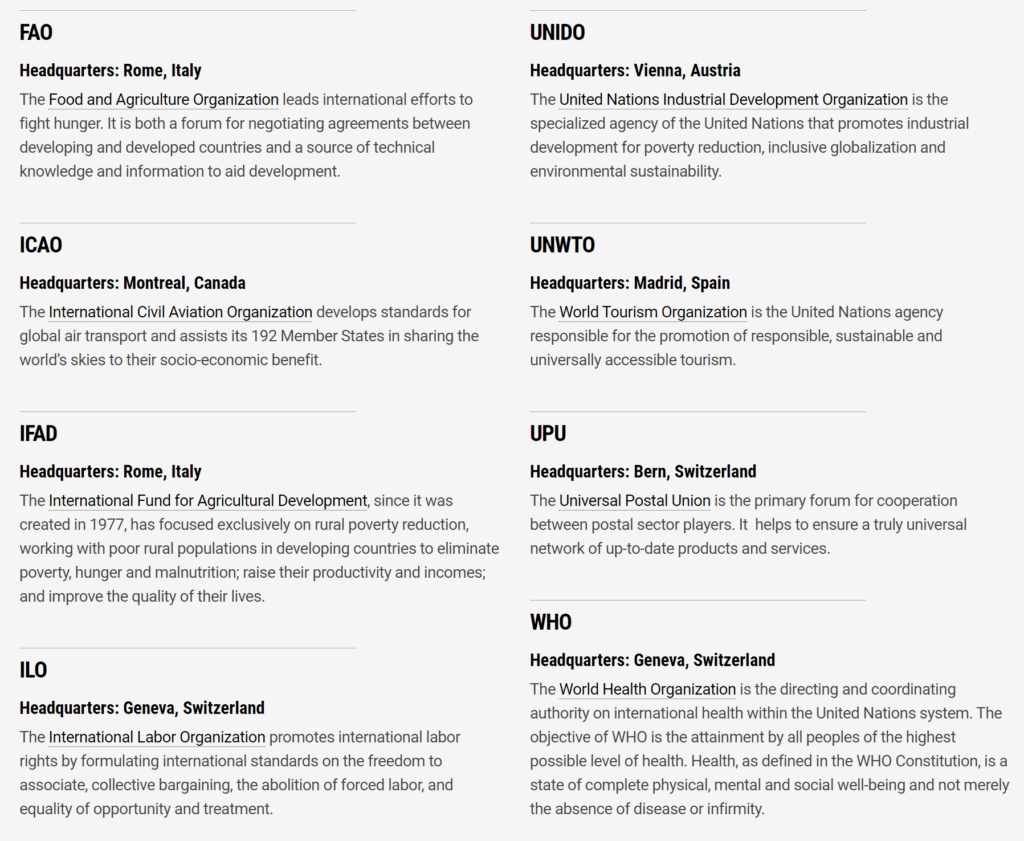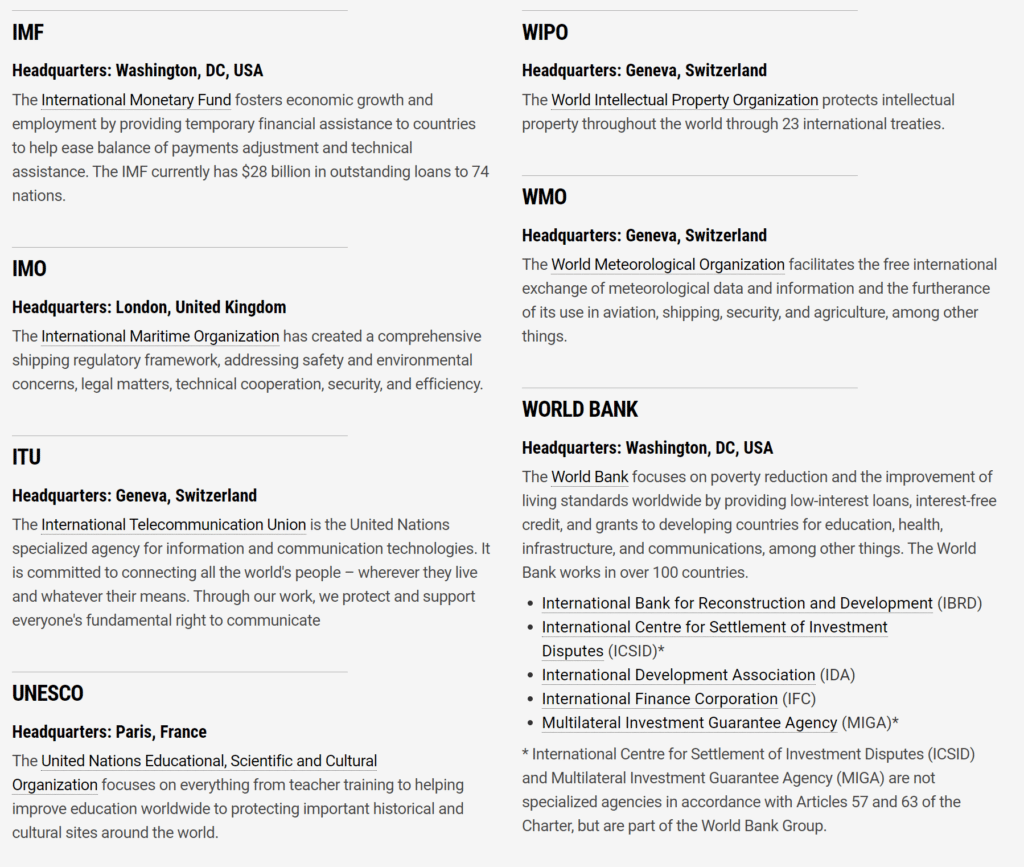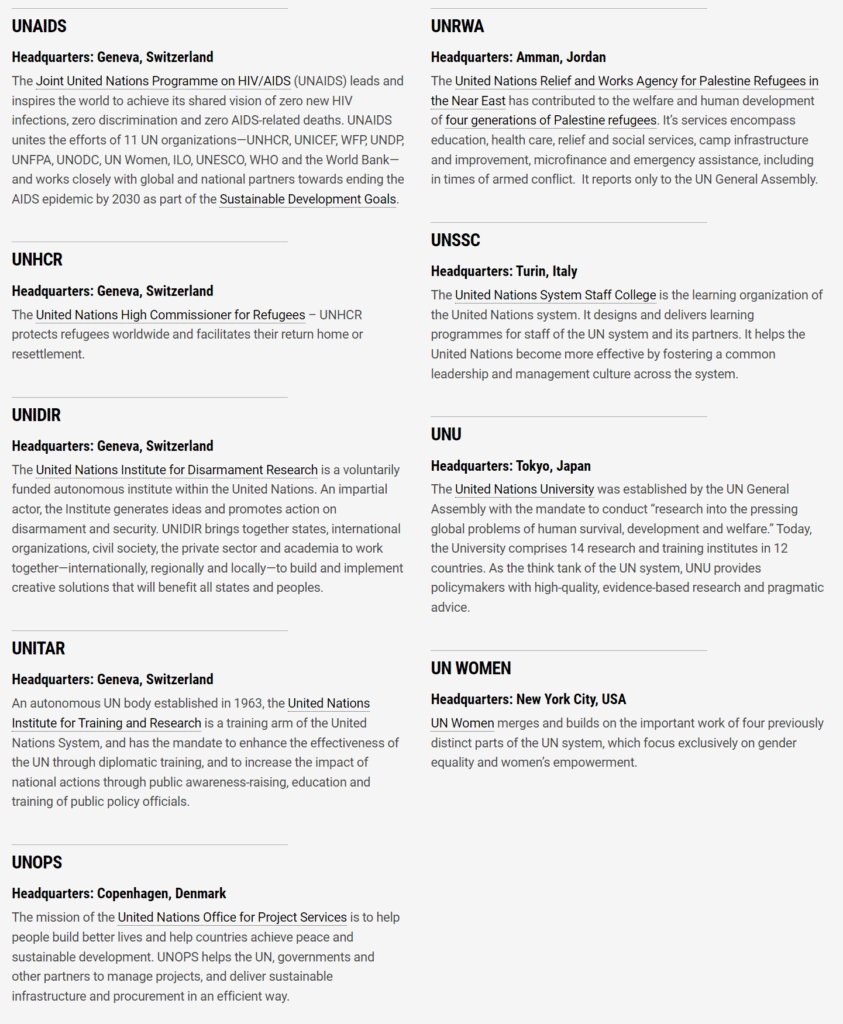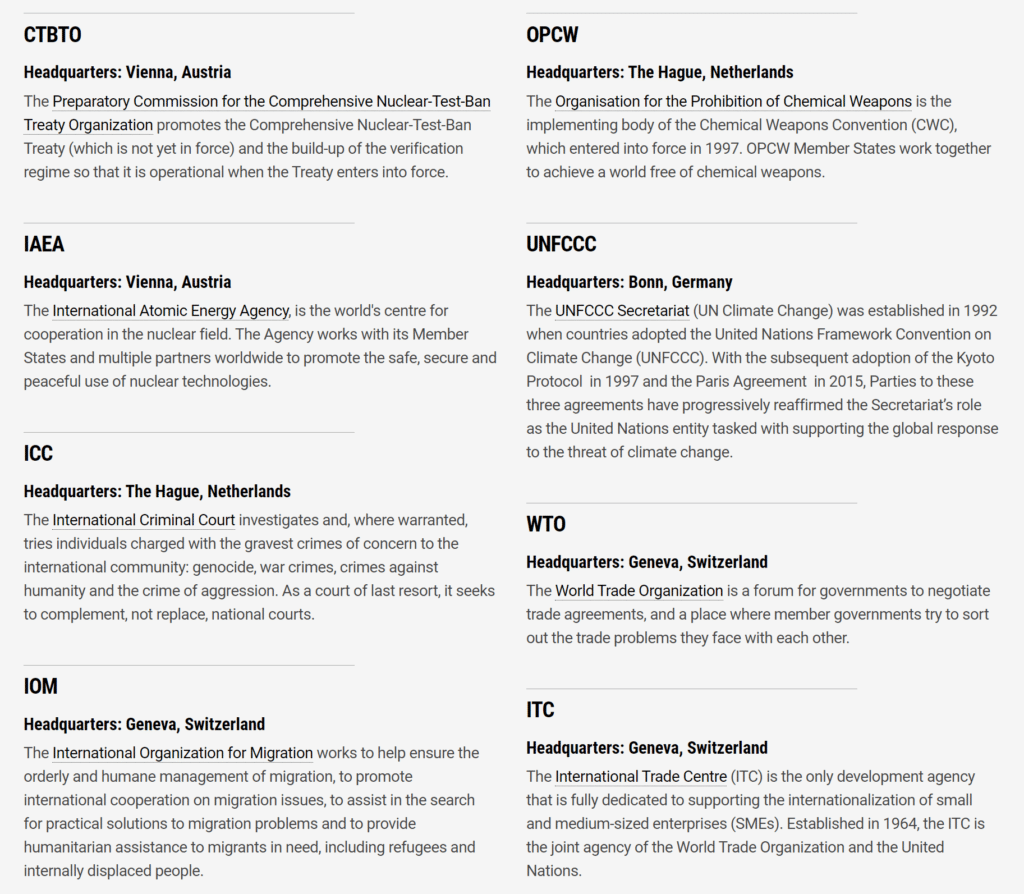- The United Nations Specialised Agencies are autonomous organizations working with the United Nations. All were brought into relationship with the UN through negotiated agreements.
- Some existed even before the First World War. Some were associated with the League of Nations. Others were created almost simultaneously with the UN. Others were created by the UN to meet emerging needs.
- Articles 57 and 63 of UN Charter provides provision of creating specialised agencies.
- Specialized Agencies each have a process for admitting members and appointing their administrative head.
- Article 58 of the Charter states that the UN will make “recommendations for the co-ordination of the policies and activities of the specialized agencies”. Coordination is facilitated through ECOSOC and the Chief Executives Board (CEB).
United Nations Specialised Agencies
There are 15 Specialized Agencies:
- FAO: Food and Agriculture Organization of the United Nations
- ICAO: International Civil Aviation Organization
- IFAD: International Fund for Agricultural Development
- ILO: International Labour Organization
- IMF: International Monetary Fund
- IMO: International Maritime Organization
- ITU: International Telecommunication Union
- UNESCO: United Nations Educational, Scientific and Cultural Organization
- UNIDO: United Nations Industrial Development Organization
- UNWTO: World Tourism Organization
- UPU: Universal Postal Union
- WHO: World Health Organization
- WIPO: World Intellectual Property Organization
- WMO: World Meteorological Organization
- World Bank Group
- IBRD: International Bank for Reconstruction and Development
- IDA: International Development Association
- IFC: International Finance Corporation
FAO
- In 1945, Food and Agriculture Organization (FAO) was created In Quebec City, Canada, by the first session of the newly created United Nations.
- FAO is a specialized agency of the United Nations that leads international efforts to defeat hunger.
- FAO is also a source of knowledge and information, and helps developing countries in transition modernize and improve agriculture, forestry and fisheries practices, ensuring good nutrition and food security for all.
ICAO
- Under Chicago Convention, the International Civil Aviation Organization (ICAO) was established in 1944, as a UN specialized agency. It manages the administration and governance of the Convention on International Civil Aviation (Chicago Convention).
- It provides the principles and techniques of international air navigation and fosters the planning and development of international air transport to ensure safe and orderly growth.
IFAD
- The International Fund for Agricultural Development (IFAD) was established as an international financial institution in 1977 through United Nations General Assembly Resolution as one of the major outcomes of the 1974–World Food Conference.
- This conference was organized by the United Nations in response to the food crises of the early 1970s, when global food shortages were causing widespread famine and malnutrition, primarily in the Sahelian countries of Africa. It was realized that food insecurity and famine were not so much failures in food production but structural problems relating to poverty.
ILO
- The International Labour Organization (ILO) is a United Nations agency whose mandate is to advance social justice and promote decent work by setting international labour standards.
- It sets international labour standards, promotes rights at work and encourages decent employment opportunities, the enhancement of social protection and the strengthening of dialogue on work-related issues.
- As an agency of the League of Nations, it was created in 1919, as part of the Treaty of Versailles that ended World War I.
- 9 International Labour Conventions and 10 Recommendations which dealt with hours of work in industry, unemployment, maternity protection, night work for women, minimum age, and night work for young persons in industry were adopted in less than two years (by 1922).
- By signing of the United Nation agreement whereby the ILO became the first United Nations specialized agency in 1946.
- The Organization won the Nobel Peace Prize on its 50th anniversary in 1969 for pursuing decent work and justice for workers.
- In 1980, the ILO played a major role in the emancipation of Poland from dictatorship by giving its full support to the legitimacy of the Solidarnosc Union, based on respect for Convention No. 87 on freedom of association, which Poland had ratified in 1957.
- It emphasised that the future of work is not predetermined: Decent work for all is possible but societies have to make it happen. It is precisely with this imperative that the ILO established its Global Commission on the Future of Work as part of its initiative to mark its centenary in 2019.
- Its job is to undertake an in-depth examination of the future of work that can provide the analytical basis for the delivery of social justice in the 21st century.
IMF
- UN Monetary and Financial Conference (1944, also called Bretton Woods Conference), Bretton Woods, New Hampshire, United States was held to regulate the international monetary and financial order after the conclusion of World War II.
- It resulted in foundation of International Monetary Fund (IMF) in 1945.
World Bank Group
- UN Monetary and Financial Conference (1944, also called Bretton Woods Conference), was held to regulate the international monetary and financial order after the conclusion of World War II. It resulted in foundation of IBRD in 1945. IBRD is the founding institution of World Bank.
IMO
- The International Maritime Organization (IMO) – is the United Nations specialized agency with responsibility for the safety and security of shipping and the prevention of marine and atmospheric pollution by ships.
ITU
- International Telecommunication Union (ITU) is a specialized agency of the United Nations (UN) that is responsible for issues that concern information and communication technologies (ICT). It is the oldest among all the specialised agencies of UN.
- It was founded in 1865 and based in Geneva, Switzerland. It works on the principle of international cooperation between governments (Member States) and the private sector (Sector Members, Associates and Academia).
- ITU is the premier global forum through which parties work towards consensus on a wide range of issues affecting the future direction of the ICT industry.
- It allocates global radio spectrum and satellite orbits, develop the technical standards that ensure networks and technologies seamlessly interconnect, and strive to improve access to ICTs to underserved communities worldwide.
UNESCO
- United Nations Educational, Scientific and Cultural Organization (UNESCO) was founded in 1945 to develop the “intellectual and moral solidarity of mankind” as a means of building lasting peace. It is located in Paris (France).
- In this spirit, UNESCO develops educational tools to help people live as global citizens free of hate and intolerance.
- By promoting cultural heritage and the equal dignity of all cultures, UNESCO strengthens bonds among nations.
UNIDO
- United Nations Industrial Development Organization (UNIDO) promotes industrial development for poverty reduction, inclusive globalisation and environmental sustainability.
WHO
- The World Health Organization (WHO) is the United Nations’ specialized agency for health.
- It was established in 1948, and is headquartered in Geneva, Switzerland.
- It is an inter-governmental organization and works in collaboration with its Member States usually through the Ministries of Health.
- The World Health Organization (WHO) is responsible for
- providing leadership on global health matters,
- shaping the health research agenda,
- setting norms and standards,
- providing evidence-based policy options,
- providing technical support to countries,
- and monitoring and assessing health trends.
World Tourism Organization (UNWTO)
- Formed in 1975, It is the United Nations agency responsible for the promotion of responsible, sustainable and universally accessible tourism.
- Headquartered in Madrid, Spain, presently its membership includes 157 countries, 6 Associate Members and 500 Affiliate Members representing the private sector, educational institutions, tourism associations and local tourism authorities.
Universal Postal Union (UPU)
- Universal Postal Union (UPU) is the primary forum for cooperation between postal sector players. It helps to ensure a truly universal network of up-to-date products and services.
- Headquartered in Bern, Switzerland, Formed on October 9, 1874 contains four bodies consisting of the Congress, the Council of Administration, the Postal Operation Council and the International bureau.
- It also oversees the Telematics and EMS cooperatives. Each member agrees to the same terms for conducting international postal duties.
World Intellectual Property Organization (WIPO)
- The WIPO protects intellectual property throughout the world through 23 international treaties.
- Created in 1967, currently having 189 member states 186 of the UN Members as well as the Cook Islands, Holy See and Niue are Members of WIPO.
- Non-members are the states of Marshall Islands, Federated States of Micronesia, Nauru, Palau, Solomon Islands, South Sudan and East Timor.
- The Palestinians have observer status and its headquartered is in Geneva, Switzerland.
World Meteorological Organization (WMO)
- Founded in 1873 as International Meteorological Organisation, Established in 1950 headquartered in Geneva, Switzerland, it has 191 members.
- The WMO facilitates the free international exchange of meteorological data and information and the furtherance of its use in aviation, shipping, security, and agriculture, among other things.


OTHER ENTITIES/AGENCIES INCLUDE
- UNAIDS: The Joint United Nations Programme on HIV/AIDS is co-sponsored by 10 UN system agencies: UNHCR, UNICEF, WFP, UNDP, UNFPA, UNODC, the ILO, UNESCO, WHO and the World Bank and has ten goals related to stopping and reversing the spread of HIV/AIDS.
- UNISDR: The United Nations Office for Disaster Reduction serves as the focal point in the United Nations system for the coordination of disaster reduction.
- UNOPS : The United Nations Office for Project Services is an operational arm of the United Nations, supporting the successful implementation of its partners’ peace building, humanitarian and development projects around the world.
UNCTAD
- United Nations Conference on Trade and Development (UNCTAD) supports developing countries to access the benefits of a globalized economy more fairly and effectively. It helps to use trade, investment, finance, and technology as vehicles for inclusive and sustainable development.
UNODC
- United Nations Office on Drugs and Crime (UNODC) is a global leader in the fight against illicit drugs and international crime.
- It was established in 1997 through a merger between the United Nations Drug Control Programme and the Centre for International Crime Prevention.
- UNODC is mandated to assist Member States in their struggle against illicit drugs, crime and terrorism.
UNHCR
- The office of the United Nations High Commissioner for Refugees (UNHCR) was created in 1950, during the aftermath of the Second World War, to help millions of Europeans who had fled or lost their homes.
- In 1954, UNHCR won the Nobel Peace Prize for its groundbreaking work in Europe.
- The start of the 21st century has seen UNHCR help with major refugee crises in Africa, the Middle East and Asia.
- It also uses its expertise to help many internally displaced by conflict and expanded its role in helping stateless people.
ESCAP
- United Nations Economic and Social Commission for Asia and the Pacific (ESCAP) is the main economic and social development centre of the UN in the region, headquartered in Bangkok (Thailand) in 1947.
- It responds to the development needs and priorities of the region through its convening authority, economic and social analysis, normative standard-setting and technical assistance.

RELATED ORGANIZATIONS
- IAEA: The International Atomic Energy Agency is the world’s centre for cooperation in the nuclear field. The Agency works with its Member States and multiple partners worldwide to promote the safe, secure and peaceful use of nuclear technologies.
- WTO: The World Trade Organization is a forum for governments to negotiate trade agreements, and a place where member governments try to sort out the trade problems they face with each other.
- CTBTO: The Preparatory Commission for the Comprehensive Nuclear-Test-Ban Treaty Organization promotes the Comprehensive Nuclear-Test-Ban Treaty (which is not yet in force) and the build-up of the verification regime so that it is operational when the Treaty enters into force.
- OPCW: The Organisation for the Prohibition of Chemical Weapons is the implementing body of the Chemical Weapons Convention (CWC), which entered into force in 1997. OPCW Member States work together to achieve a world free of chemical weapons.
- IOM: The International Organization for Migration works to help ensure the orderly and humane management of migration, to promote international cooperation on migration issues, to assist in the search for practical solutions to migration problems and to provide humanitarian assistance to migrants in need, including refugees and internally displaced people.

